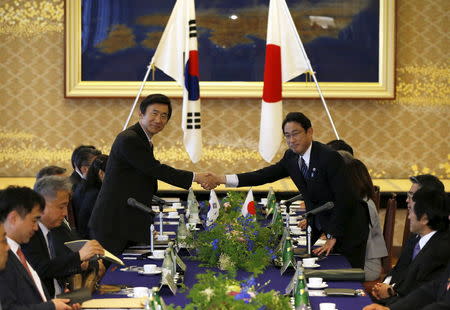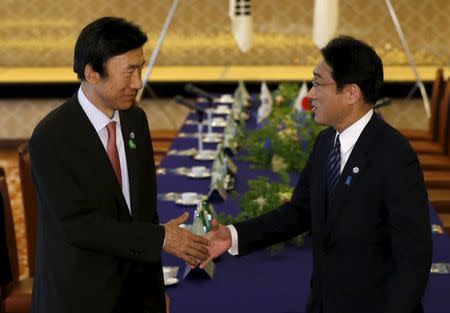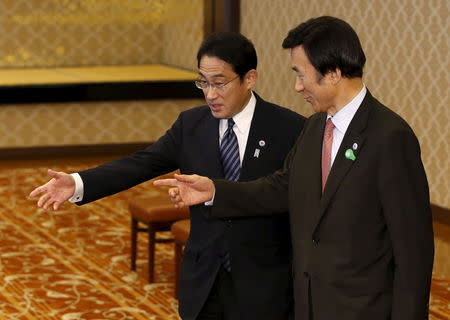Japan and South Korea aim for three-way summit with China by December
By Kiyoshi Takenaka TOKYO (Reuters) - The Japanese and South Korean foreign ministers agreed on Sunday to aim for a three-way summit with China by the end of the year, the Japanese Foreign Ministry said, paving the way for the first one-on-one meeting between Tokyo and Seoul's leaders. Japan's Fumio Kishida met his South Korean counterpart, Yun Byung-se, to try to mend ties strained by a territorial dispute and a feud over "comfort women" forced to work in Japan's wartime military brothels. The strain in relations is complicating efforts to boost security cooperation between Japan and South Korea, two of the United States' main Asian allies, as the region copes with an unpredictable North Korea and an assertive China. South Korean President Park Geun-hye and Japanese Prime Minister Shinzo Abe have not held bilateral talks since taking office. However, Sino-Japanese ties, similarly frayed by an island dispute and Japan's wartime legacy, have seen a thaw since Abe and Chinese President Xi Jinping held their first summit last year. Japan's ambassador to South Korea, Koro Bessho, said in an interview with the Mainichi Shimbun daily on Saturday that he was certain that a meeting between Abe and Park would be held on the sidelines of a trilateral summit involving Japan, South Korea and China. "We have managed to confirm our intention of maintaining dialogue despite difficult problems existing between the two countries. It was a meaningful meeting," Kishida told reporters. On the issue of "comfort women", Kishida and Yun reiterated their positions, a Foreign Ministry official said. South Korea says Japan has not properly atoned for its wartime past, including its role in forcing Korean women into prostitution at military brothels, while Japan says the matter of compensation for comfort women has already been settled. Kishida's meeting with Yun took place a day ahead of the 50th anniversary of the signing of a treaty that normalised ties between the two countries. The South Korean government announced on Sunday that Park would attend a ceremony in Seoul to mark the occasion and the Japanese government said Abe will take part in a corresponding reception in Tokyo, both taking a symbolic step to improve ties. Just a few days ago, they were widely expected by local media to send their messages to the events without showing up. (Additional reporting by Linda Sieg in TOKYO, Jack Kim in SEOUL; Editing by Nick Macfie and Digby Lidstone)




